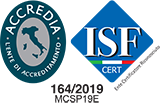Innovation: ambassador of change
The MECSPE LAB area represents the beating heart of innovation and professional growth at MECSPE Bologna 2025. A dynamic ecosystem where ideas, skills, and opportunities converge, fostering dialogue between businesses, young talents, and key players in the manufacturing sector.



